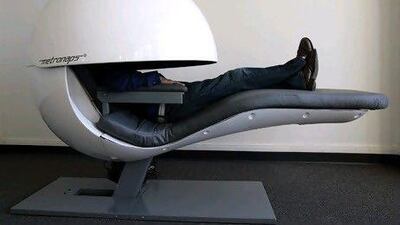Historians probing the causes of the financial crisis may want to check the sleeping habits of key investment bankers and lawyers.
Among this set, working 18-hour days and surviving on minimal sleep is a source of considerable pride.
But researchers at two Duke University medical schools say coming up short on shut-eye causes people to take unnecessary risks, especially when it comes to money.
The study published in the Journal of Neuroscience found a single night of sleep deprivation "evoked a strategy shift during risky decision making such that healthy human volunteers moved from defending against losses to seeking increased gains".
Put simply, the test subjects tended to take bigger financial risks than their peers who were wide awake, while downplaying the negative consequences.
Sound familiar? It has now become clear that excessive risk taking was one of the key factors in bringing about the worst economic crisis since the Great Depression.
But finance professionals say it is difficult, if not impossible, to work nine to five.
One investment banker at a UAE bank, who claims he is suffering from burnout, says his average workday of 8am to 8pm can easily swell to include several all-nighters in the course of a deal.
"If we're launching a deal, we can't afford to wait for positions to change," he says.
International transactions that require co-ordination of conference calls with several banks, law firms and advisory services in different time zones could be particularly gruelling, the banker says.
The Duke researchers questioned the social value of letting sleep-deprived people make financial decisions, whatever their profession.
"Even if someone makes very sound, risky financial decisions after a normal night of sleep, there is no guarantee this same person will not expose you to untoward risk if sleep deprived," says Michael Chee, a co-author of the study and professor at the Neurobehavioral Disorders Program at Duke-NUS in Singapore.
"I think it's critical that society consider whether to continue doing things the old way," Prof Chee says.
Other professionals accustomed to long hours, such as leading lawyers, said taking a break was often essential for peak performance.
Reza Mohtashami, a partner and the head of Middle East international arbitration at Freshfields Bruckhaus Deringer in Dubai, also works an average day of 8am to 8pm, with the occasional long night when a case is due.
"My practice is litigation and international arbitrage, therefore it's set by the courts and the arbitrators," Mr Mohtashami says. "There'll be ups and downs and it's a function of deadlines that come and go.
"You might be up late some nights and only get five hours sleep but you'll get to take it easy later."
The elite law firm could not allow sleep deprivation among its lawyers to lead to mistakes in court or other errors, he says.
"If someone is too tired to be productive, then it's actually harmful for them … not only for their own health but for the work they produce," Mr Mohtashami says.
"We'd rather send people home to get a good night's sleep and come in the next morning. In terms of risk, we live or die by our reputation and how careful we are."
While companies on Wall Street and in the City of London have in-house doctors and even hairdressers to maximise the amount of work that can be squeezed into the waking hours, the relatively small size of operations in the UAE means such pampering is a far less common here.

